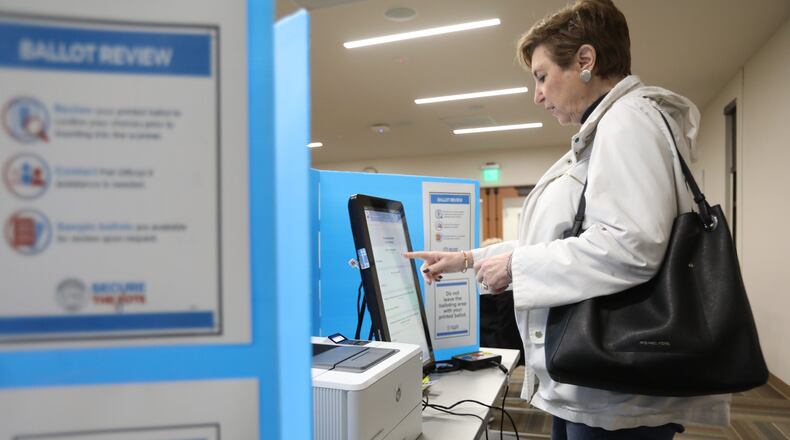Nearly 700 people trekked through a dreary Tuesday to test Fulton County’s new voting machine system.
Richard Barron, Fulton’s director of registration and elections, said the technology worked in the field and did not malfunction when counting votes during the trial run.
The ballots asked people to identify things like the state bird (brown thrasher) and the state flower (Cherokee rose). Those are low-stakes queries compared to what the machines will ask hundreds of thousands of voters about later this year — who they want to lead the nation and their communities.
Barron said he was surprised by the turnout. But a dry-run in Georgia's most populated county is a big moment amid the largest rollout of elections equipment in U.S. history.
The state awarded Dominion Voting Systems a $104 million contract this summer to provide more than 75,000 new computers and printers to 2,600 precincts. The 18-year-old electronic machines in Fulton lacked a paper ballot and are being replaced with a patchwork of touchscreens, printed ballots and scanners.
Voters make their selections on large tablets, the system prints out the selections with a code, then the voters take their paper to a scanner, which records the vote and retains the printout as a paper record. Voters tested equipment at 13 locations throughout Fulton.
The biggest issue Tuesday, said Barron, was that voters wanted to take their printouts home as a receipt. As a voter, it’s tough psychologically to get what feels like documentation of your precious vote but not be able to keep it. But keeping the paper means not only that your vote isn’t recorded, but it’s a crime.
Recent years have brought a heightened awareness of how our election systems works, and increased skepticism. But it's not just at the federal level. Four candidates in Fulton contested their elections at the end of last year, which is the most the county has had in six years.
Carel Walton, who used the machines at the Sandy Springs Library on Tuesday, said the system worked well but still had a sense of weariness about whether it will work during a large election.
Walton, a retired healthcare worker who has voted in Sandy Springs the last four decades, said it’s a shame she feels like she can’t trust her elections. “It’s what defines us as a democracy,” she said of the privilege to vote.
Evelyn Harper, who has been in East Point since 1977, said her mock voting experience on Tuesday took five minutes and went well, adding that the machines are similar to working on the computer.
Andrea Settles in Sandy Springs said the screen worked well, but she wanted more signage to explain what to do with her voter card and paper.
Barron said there will be signs and extra poll workers to help voters.
The first live test starts March 2, when early voting begins for the presidential primary election, and ends March 24 on Election Day.
Wouldn’t you like to support our strong journalism? Your subscription helps us cover your communities in a way that no one else can. Visit https://subscribe.ajc.com/hyperlocal or call 404-526-7988 to begin or renew your subscription.
How does the new system work?
• Elections workers install voting machines into a mobile metal cabinet and deliver them to Fulton County’s 198 precincts, turnkey ready for Election Day.
• Voters walk up to the six-foot cabinet, cast their votes on a touchscreen, then get a printout showing their selections and an encoded pattern of dots and squares that a computer uses to record votes. That paper is scanned and kept for 30 days at the warehouse and then for two years at the Fulton Superior Courthouse.
• Once the polls close, two people take the flash drive from the scanner with all the precinct’s results to one of the county’s five check-in locations.
• Elections staff there will lock the flash drive in a bag that a police officer and an elections worker drive to the warehouse, which holds the only key that can unlock the bag.
• County staff tabulate the vote.
About the Author
Keep Reading
The Latest
Featured



